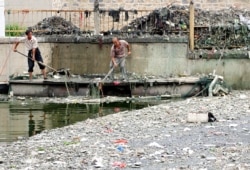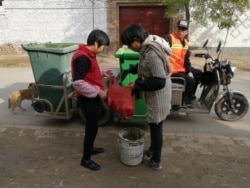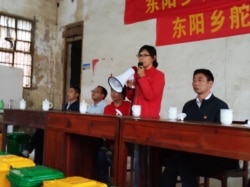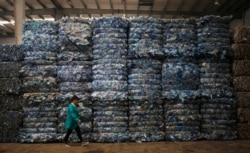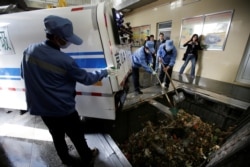When Chen Liwen returned to her parents’ village in Hebei province after earning her master’s degree in California, she was shocked by what she saw.
Garbage despoiled the landscape where she had played as a child. Then 36 years old, she knew China had changed, but the amount of garbage in Xicai revealed just how much prosperity had altered frugal habits. The villagers had shifted from only shopping locally to buying online.
The demise of household farming meant the food waste once fed to pigs, ducks and chickens wasn’t recycled, it rotted. They threw away clothes, which would have been handed down, then turned into useful scraps and reused until colorless.
Chen’s village reflected the nation. In the 1980s, still-poor China generated on average 30 million tons of garbage annually. By 2017, China generated 215 million tons, compared to 268 million tons generated by the U.S. that year. The World Bank estimates that by 2025, China will generate 500 million tons of solid waste annually.
Since that visit home in 2017, Chen, whose graduate degree is in geography and environmental history, has taken it upon herself to improve China’s environment, one village at a time. Ideally, that would result in zero waste. Realistically, reducing consumption, reusing materials and recycling waste would be a good start.
Chen knew the challenges she faced. She had embraced environmentalism as a college student, then worked with various NGOs to reduce China’s air and water pollution until she enrolled at the University of Southern California in 2015.
In July 2017, she founded Zero Waste Village, a nonprofit organization headquartered in Beijing and, with her team, began changing waste habits with the people of Xicai.
The team removed public trash cans, a counterintuitive move that stopped villagers from dumping trash willy nilly.
The team distributed green bins for compost and yellow bins for other kinds of waste. Team members visited each of the 480 houses in Xicai to explain the best way to sort waste.
“Waste sorting needs a change of collective behavior, and that is relatively easier to achieve in villages rather than big cities,” Chen said, acknowledging the power of group pressure. “There’re fewer people, and they all know each other.”
The village also had access to land so composting organic waste wasn’t the smelly, messy chore it can be in densely populated cities.
“The village really surprised me,” Chen said. “People really supported the cause.”
Chen’s efforts coincide with China’s push to crack down on waste. In July 2017, Beijing upended recycling programs worldwide by all but shutting down what had been the waste industry’s biggest market.
“To protect China’s environmental interests and people’s health, we urgently adjust the imported solid wastes list, and forbid the import of solid wastes that are highly polluted,” China’s filing with the World Trade Organization said.
The move coincided with an environmental effort led by President Xi Jinping. Tens of thousands of polluting factories were closed in an effort to counter ecological damage and improve citizens’ health.
The government promoted renewable energy and Xi touted the active pursuit of “green development … and a clear shift away from the tendency to neglect ecological and environmental protection,” when he addressed the National Congress of the Chinese Communist Party on Oct. 18, 2017.
China’s National Sword policy, implemented in January 2018, banned the import of 24 types of recyclables and solid waste, including most plastics, paper products, slag from steelmaking and many kinds of textiles, among other items.
A year later, in 2019, the Chinese Ministry of Ecology and Environment announced the banned list would expand to include 32 categories, including post-consumer plastics such as soda and water bottles.
That same year, China announced a plan to promote zero waste in 10 cities, including Beijing and Shanghai, with the aim of reducing the impact of solid waste from household, industrial, medical and other sources, while eliminating illegal dumping, according to China Water Risk (CWR) in Hong Kong.
By that time, Chen’s Zero Waste Village team managed to cut landfill-bound waste in Xicai village by over 70% in six months. But Xicai has 1,600 residents, or 0.00007% of Beijing’s population.
About 130 miles north of Xicai, Beijing collected approximately 10 million tonnes of waste in 2018, a weight equivalent to 30 Empire State Buildings.
According to a 2018 survey conducted by the Vanke Foundation and Dataway, fewer than 28% of the 3,600 major big-city residents surveyed knew how to separate garbage from recyclables. The survey involved 102 residential communities in 17 cities, including Beijing, Shanghai and Guangzhou.
Now, Beijing’s municipal government is trying to roll out its first revision of its 2012 trash law. Residents must now
Lin Xudan, 62, a resident of Beijing’s Chaoyang district, said she hasn’t seen any real change in how people behave. “We have bins downstairs that say ‘Trash’ and ‘Recycle’ but no one is sorting their garbage,” she said.
It may be a problem of scale, something Chen accepts as she goes village to village educating residents faced with lineups of sorting bins.
“Fixing China’s trash problem will take years, and now what we are doing is the first step,” Chen said. “If we want to keep the trash from coming back, we need to make waste sorting and recycling a habit, not just a rule.”





